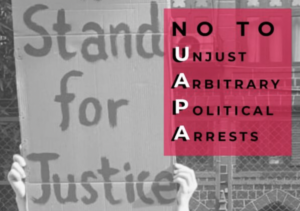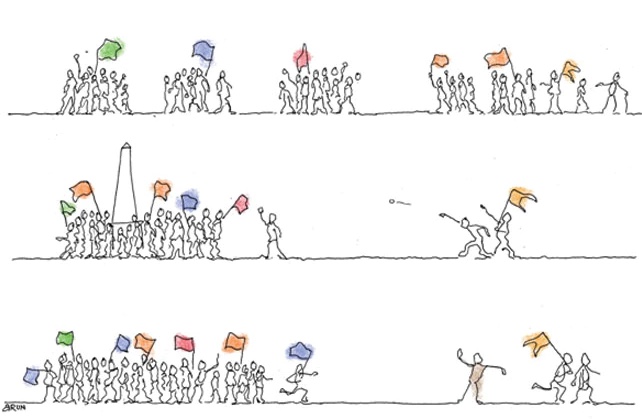
Outlook / by Pritha Vashisth
In its February 1 issue, Thou Shalt Not Dissent, Outlook turns to the voices of those who have lived this reality, mapping the human cost of repression, imprisonment and unyielding courage in the face of state power
“I am not a silent spectator, but part of the game and ready to pay the price whatever be it.”
When Stan Swamy spoke these words, he was 85 years old, physically frail but unyielding in spirit. Arrested in 2020 in connection with the 2018 Bhima Koregaon case, the Jesuit priest and Adivasi rights activist became the oldest person in India to be charged under anti-terror laws. Months later, with his bail application still pending, he died in custody, his life caught in limbo between accusation and justice.
Read more
Also read:
▪ Voices From Prison: Imprisonment Sends A Calculated Message To Everyone Else (Outlook / Jan 2026)
▪ Voices From Prison | A Legacy Of Detention: Weaponisation Of PDA, TADA, NSA And UAPA Laws Since Independence (Outlook / Jan 2026)
▪ Voices From Prison: Mahesh Raut | A Broken Prison System Is In Dire Need Of Critical Care
22/01/2026
Outlook / by Mahesh Raut
Mahesh Raut, the youngest accused in the Bhima Koregaon case, was granted interim bail on medical grounds. Many prisoners have no hope.
What constitutes freedom? What does it constitute for the person who is confined or for the one who comes out of jail, only to get entangled in another web of chains; some similar, but for others, different from what they experienced behind bars. In a prison, your identity is reduced to just a number. You are dehumanised at the whims of authorities and burdened by numerous hurdles and difficulties to secure bail. Many are not able to come out of prison even after securing bail due to financial constraints. All these factors take a toll on the physical and mental health of prisoners.
Read more
▪ Voices From Prison: ‘In Jail, I Measured Time From One Court Date to Another’
21/01/2026
Outlook / by Shoma Sen
Women’s rights activist and professor Shoma Sen, who was arrested in 2018 for her alleged involvement in the Bhima Koregaon riots, writes how in prisons, time comes to a standstill, literally
Though it is true that I did time, it appears more as if time did me. One cloudy evening, on June 21, 2018, when I was being taken to the Yerawada jail in Pune, I knew that watches were not allowed in jail, yet I had clung on to my basic Titan watch. I had to submit it at the gate. It was returned to me, looking like a museum relic, almost six years later. Time, trapped in a brown sarkari envelope, sealed in a metal box. Time that had stopped ticking.
Read more
▪ Me Coming Out Alive Is A Miracle: Hany Babu, Bhima-Koregaon Accused, On Life Behind Bars
21/01/2026
Outlook / by Hany Babu M.T.
More than five years after his arrest under the UAPA in the Bhima Koregaon case, former Delhi University professor Hany Babu was granted bail in December 2025. He shares his experience of prison life.
Mornings start very early in jail, but they never come with an air of freedom. It has only been three to four weeks since I came out; the bail arrived quite late for me. Five years is a long time compared to my co-accused. Throughout these five years, hope never left my sight, even when I contracted Covid. But there were indeed times when a little despair did creep in.
Read more
▪ Correctional Facility Or The World Of Endless Repetition, Solitude and Boredom?
21/01/2026
Outlook / by Rona Wilson
The prison system in India, persistently mediated and nourished by its colonial and retributive sensibilities, cannot be wished away by just changing the names of the prisons as correctional facilities, writes Rona Wilson, accused in the Elgar Parishad-Maoist links case.
I had trouble in my barrack with some of the inmates smoking heavily beside me and some among them playing ludo till the wee hours. As the game intensifies with gambling, so does smoking and use of tobacco. I requested the officer-in-charge of my circle to intervene.
Read more
▪ Voices From Prison: Life After Jail Is Tough, But Surveillance, Harassment Continue, Says Sudha Bharadwaj
20/01/2026
Outlook / by Sudha Bharadwaj
I am enormously relieved that the separation from my only daughter, Maaysha, has ended. We can speak to each other every day.
A couple of weeks ago, cops in civil dress—or so they claimed to be—arrived in the society where I live in a friend’s accommodation on rent. The police have my mobile number, which, no doubt, they monitor regularly. Besides, I report to the local police station every 14 days, and I regularly attend court dates, at least once every 15 days, if not more frequently. Despite this, the police did not bother to call me.
Read more
▪ Voices From Prison: In The Isolation of the Anda Ward, We Dared To Sing, Writes Gautam Navlakha
20/01/2026
Outlook / by Gautam Navlakha
I realised that the more intense the sense of despair, the harder hope kicks in.
‘Those who speak of humanity in this system
Are thrown into prison to acquaint them
With the vocabulary of ‘criminology’’’
— Varavara Rao, Schools and Prisons
Hope and despair are basic human emotions and I believe that all human beings, now and then, swing between these two ends of the spectrum in life. I experienced these emotions acutely during my time in prison and captivity.
Read more
▪ Voices From Prison: Alienating A Poet From A Language He Deeply Loves Is Painful, Writes Varavara Rao’s Daughter
20/01/2026
Outlook / by P Vanava
The poet and activist was jailed in connection with caste violence that erupted in 2018 in Bhima Koregaon. He was 78 then. Though he was released on medical grounds in 2022, he is still confined to Mumbai. In this first-person account, his daughter Pavana writes about how multiple incarcerations could not break her father’s strength and soul
…
This wasn’t his first arrest; he has been arrested many times in the past, since the Emergency in 1975, for his political activism. I was a newborn baby (a month old), when appa was arrested.
Read more
▪ Voices From Prison: Bail Is Little Solace As I Lost My Life Anyway, Says Anand Teltumbde
19/01/2026
Outlook / by Anand Teltumbde
We became victims of two things—unjust investigation and a media trial that was used as a weapon. The Media Trial was Deeply Painful.
The tragic dimension of jail has been exhaustively mined. What remains scandalously underexplored is its comic genius. Prison is a factory of absurdity, running at full capacity every day, and I made it a habit to collect its specimens—especially during the so-called free hours, when the cells were opened each morning. This ritual began with the ceremonial clanking of batons, as guards slid them menacingly across steel bars, producing a sound—less like an alarm than a declaration of sovereignty.
Read more












